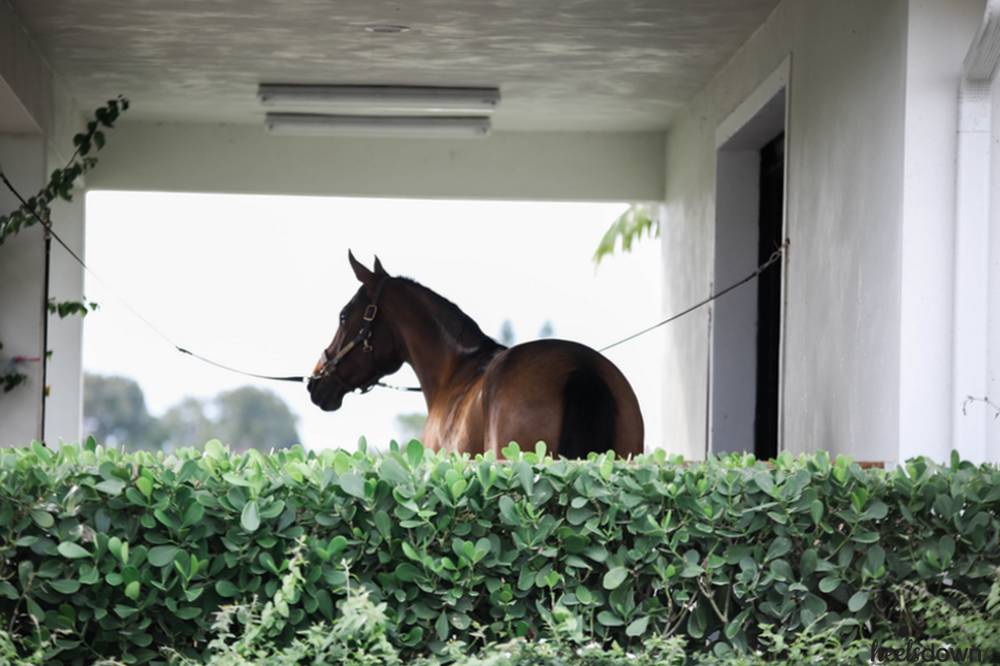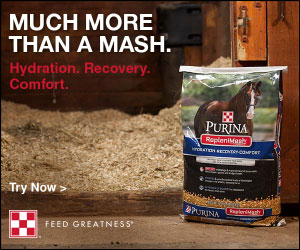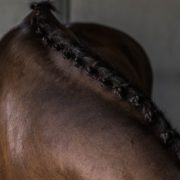How To Cope When Everything Sucks

As equestrians, the barn is often the place where we find our solace. It’s where we go to unwind after a long day. It’s where we can free our mind from the daily grind and find our peace.
Sometimes it can be hard to let go of our worries, even when we’re with the horses. Or sometimes we just can’t make it to the barn as often as we want to, and that adds just another layer of stress.
Heels Down Mag spoke with Dr. Gabby Ledger, a physician in Ontario, Canada, who is a former family physician and now an adolescent psychiatrist, about how to cope with stress during difficult periods. She’s also an equestrian who competes at the intermediate and two-star level in eventing.
“Going to the barn is basically involuntary meditation for a lot of us,” said Dr. Ledger. “There is so much stimulation for our senses (aromatherapy!) and horses, being prey animals, encourage us to be slower and smoother in our movements, breathing and thoughts.”
Any advice on how to cope if you’re not seeing your pony as much as you’re accustomed to?
“Some people I know have spent some of their free time on horse related activities that help them to feel like they are getting to spend a bit of time in the world they are missing, even if it’s not with their favorite equine. Reading horse training books or fiction, watching movies or educational videos, competition videos etc., all of that can still happen while we are in the midst of a pandemic.”
Horse shows are cancelled. It sucks. Where could you put this misplaced energy that went into goal preparation for the circuit?
“Figure out what aspects of showing you are missing and see if there is another way to meet those needs. For example, having a show schedule can provide structure by organize your training and provide you with short, medium and long-term goals but just because you can’t show doesn’t mean you can’t find that structure. Create your own end-of-season goal that is not competitive and work backwards to find the medium and short-term goals that will get you there.
There are some really cool riding books out there with exercises that build progressively from the beginning to the end of the book (Wofford’s “Modern Gymnastics: Systematic Training For Jumping Horses“, for example, or “101 Arena Exercises For Horse and Rider“). These can be a fun use of the time away from showing and give you a very real sense of the steady progress.
If you are missing the feedback from the showing experience consider virtual lessons, or even regular video sessions.
“Acknowledge the loss of the season, validate that grief, but don’t become bitter about it.”
There may be lots of projects you can take on at home or around the farm – painting jumps, building cross-country jumps or making new trails, improving facilities… any activity that give you a good ‘before and after’ visual comparison is likely to help you feel a sense of accomplishment that you may be missing these days.
Those of us that are missing our horse show friends can make efforts to connect outside of the show grounds in messages, phone calls, video chats and for some people even in person (hopefully with appropriate social distancing).”
What are some good tips to re-evaluate your riding goals?
“It’s OK to feel bummed that the season is a bust (and don’t feel guilty about those thoughts) but focusing on the fact that it is out of everyone’s control and most of us are in the same boat (figuratively stuck on shore) can soften the sting.
Sometimes working on aspects of riding that you don’t normally have time for can be really rewarding. For example, working your horse on the ground can really improve your relationship and your riding work by building trust and communication.
Or maybe you now have time to learn a new skill like how to do a different type of braid or how to bang a tail. You might finally have time now to go through all those bins of old tack and supplies and sell what you don’t need to finance your end of season goals for 2021! Acknowledge the loss of the season, validate that grief, but don’t become bitter about it.”
It can be hard to stomach this sense of loss of control. How do you cope with this?
“I think looking for what you can control is really the key here. For some of us, controlling something very close and tangible like our immediate surroundings may be key (cleaning, decluttering, redecorating, etc.)
Others are putting energy toward promoting equality, advancing society through advocacy and solidarity. Feeling like you are part of something bigger with a shared goal is empowering and can bring a real sense of meaning to your life when you spend time on these issues. When you are used to focusing on your career as an athlete and the competition season is cancelled, of course you can feel lost and unmotivated but this is exactly the kind of moment that can allow you to look for and cultivate other aspects of yourself and grow in a new direction.”
Is it OK to “unplug” or disconnect – in that, Facebook or even reading the news can feel toxic?
“100% YES!!! I’m a psychiatrist and I personally have had to take several long breaks from social media in the last few months. I even removed the Facebook app from my phone. I’m back on at the moment but it may not be a good thing for me. I feel compelled to address harmful misinformation online – it’s an ethical responsibility that comes along with having an MD, in my opinion. This means I also get stuck engaging with incredibly self-assured but misinformed jerks on the regular. I don’t have a solution for this problem as ‘just scroll on by‘ feels like a cop out to me personally, but I think we need to think of ourselves as part of a team of people forming an online community and sometimes we all need to sub ourselves out and let someone else take over for a while.
The other thought that helps me personally with these online debates is remembering that the person I’m discussing the topic with may not change their mind but if I do a good job of presenting good information in an understandable format then maybe someone else will learn from it and pass it on and that is no less significant.
Social media is a way to connect when we are disconnected, and allows us to laugh together and comfort one another at a distance, but it can certainly contribute to frustration and despair for any of us.
The good news is, learning to meditate is a really useful skill. There are some great apps out there that can teach you how to do it fairly painlessly and eventually knowing how to control your thoughts, breathing and focus can be skills that help your riding as well. Check out ‘Mind Shift”, “Head Space” or “Calm” if you want some app suggestions.”


